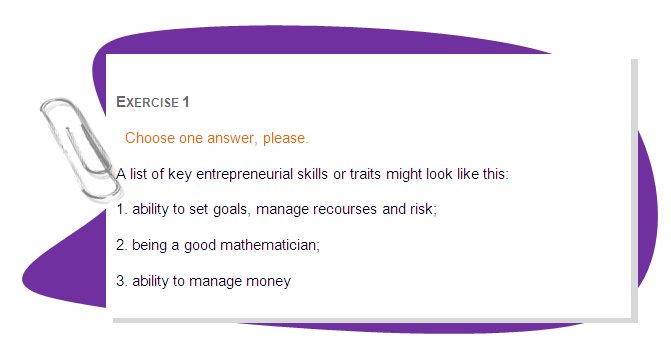Key Competencies Kit
for Facing Lifelong Learning


 |
This Project has been funded with support from the European Commission. This communication reflects the views only of the author, and the Commission can not be held responsible for any use which may be made of the information contained therein. |
 |

Have you ever thought that running your own business might be for you? Entrepreneurship has brought great success for some, but it's not a path for all.
As an entrepreneur, you do not have bosses to tell you what needs to be done. Everything rests on your shoulders from thinking where to get the money to fund the business, to producing product, to determining how to sell it.
Only you will formulate plans, and change them. You need to be smart enough to know when you need to go ahead, and when to stop.
To succeed in business, you must be a self-starter with a clear goal in mind. You must have the confidence in yourself, and in your ideas. A great idea alone, however, is not sufficient for business success.
The key to success is your entrepreneurial ability to produce results.
So, before starting on your first business, you begin listing down what you want to do and what you can do. But then, you ask yourself, “What skills do I really need to have to succeed in business?
For starting business, you will need a broad array of entrepreneurial skills to succeed in today's competitive market. There are a number of qualities and skills you need to have, including personal attributes, business skills and management capability.
While you may not have all of them right now, there are five basic skills you really must have to run any kind of business capability.
A list of key entrepreneurial skills or traits might look like this: ability to set goals, manage recourses and risk; objectively assess personal strengths and weakness, be motivated and be creative.
Starting a business is never easy, even if you have the perfect background and possess all the above skills. Having all the needed skills and qualities will not even ensure your success. But having these basic skills will, at least, lessen the pain of the start-up process, giving you greater chance in seeing your business grow and prosper.
Didactic Unit 1 |
Theme |
Time |
Sense of initiative and entrepreneurship |
basic notions of key entrepreneurship skills; |
1 hour |
role of entrepreneurship skills in ensuring independence and income security; entrepreneurship skills in small business and civic initiatives; |
Entrepreneurship can be described as a new way of looking at opportunities and new approaches to solving problems. Creativity is 'thinking' about new things, coming up with ideas. Innovation is 'doing' new things or implementing the newly created ideas.
In the most general sense of the word, an entrepreneur is someone who organizes a business venture and assumes the risk for it. But true entrepreneurship goes way beyond this simple definition.
When most people think of entrepreneurs, a few well-known names probably come to mind, including such people as Henry Ford, Andrew Carnegie and Bill Gates.
Just who is an entrepreneur? Anyone who has ever looked at a problem and seen it as an opportunity is a likely to be entrepreneur.
Contrary to popular belief, entrepreneurs are not generally high-risk takers when they cannot affect the outcome of the situation. They tend to set realistic and achievable goals, and when they do take risks, they are usually calculated ones based on facts and experience, rather than instincts.
Entrepreneurs are driven not by the need to make money, but by the need to make their dreams a reality. More often than not, money is a by-product of an entrepreneur's motivation rather than the motivation it.
Entrepreneurs are participants, not observers; players, not fans. And to be an entrepreneur is to be an optimist, to believe that with the right amount of time and money, you can do anything.
Entrepreneurs occupy a central position in our market economy. The most dynamic societies in the world are the ones that have the most entrepreneurs.
Its entrepreneurial energy, creativity and motivation that trigger the production and sale of new products and services. It's the entrepreneur who seeks opportunities to profit by satisfying as yet unsatisfied needs. It is the entrepreneur who seeks a gap between the wants and needs of the customers and the products and services that are currently available--and finds a way to fill that gap.
As an entrepreneur you are on your own and you must personally seek all information that gives you clear understanding of how to work; communicate with people, and do many other things for which you will need transferable skills and competences.
Note that an entrepreneur is self-driven, always craving for productive work, and always committed to finish what needs to be done If you lack the initiative, energy, and determination it will be difficult to succeed as an entrepreneur. Entrepreneurs are optimistic and future oriented; they believe that success is possible and are willing to risk their resources in the pursuit of profit. They are fast moving and flexible, willing to change quickly when they get new information. Entrepreneurs are persistent and determined to succeed.

Very often entrepreneurship is linked with financial independence and income security.
Financial independence is possible. To achieve financial independence we, first of all need to change our thinking about it.
Financial independence is actually more of a mentality than it is a money sum in a bank account. It is more about not worrying and having time freedom than it is about being capable of always paying the bills. It is about overcoming fear and taking risks as much as it is about saving for retirement.
Unfortunately, the majority of people do not think this way – they live far below their potential because they are unwilling to take risks, think and act differently, and understand the essential laws of success that ensure financial independence.
Job security is not the same as financial security. Independence within your job is not even similar to financial independence. Financial independence is making money work for you; the goal is to create assets that continually bring in income. Anyone who has ever achieved financial freedom has independently created it themselves, took risks, and was proactive.
The goal should not be to get rich in life, it should be to enrich your life.
 |
Answers to the questions and exercises of Didactic Unit 1 |
1.